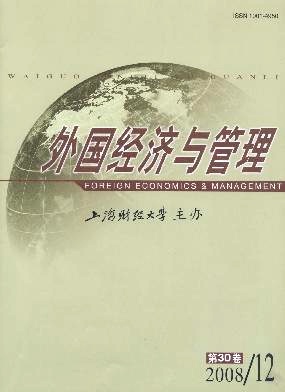组织理论认知观评介
外国经济与管理 2008 年 第 30 卷第 12 期, 页码:18 - 24
摘要
参考文献
摘要
组织理论认知观认为,组织决策和组织治理的主要挑战源于诱因、认知、心智模式的安排和共享认知机制的设计。本文详细、深入地探讨了组织理论认知观的核心概念、基本假设和理论思路等问题。
[1]Mie S Augier,and DSarasvathy.Integrating cognition,evolution,and design:Extending Si monian perspectives to strategic organiza-tion[J].Strategic Organization,2004,2(2):169-204.
[2]Antonio,Strati.Understanding cognitionin organization studies[J].Scandinavian Journal of Management,1998,14(4):309-329.
[3]Jonathan Gosling,and Henry Mintzberg.The five minds of a manager[J].Harvard Business Review,2003,81(11/12):54-63.
[4]Bart Nooteboom.Beyond Penrose:Acognitive theory of the firm[R].Discussion Paper34,Tilburg University,Center for Economic Research,2006.
[5]Siegwart MLindenberg.Governance seenfroma framing point of view:The employment relationship and relational signaling[A].in Bart Nooteboom,and Frdrique E Six(Eds.).The trust process in organizations:Empirical studies of the determinants and the process of trust development[C].Cheltenham:Edward Elgar,2003:37-57.
[6]Z Shapira.Governancein organizations:Acognitive perspective[J].Journal of Management and Governance,2000,4(1/2):53-67.
[7]Anna Grandori.Governance structures,coordination mechanisms and cognitive models[J].Journal of Management and Governance,1997,1(1):29-47.
[8]Anna Grandori.Neither hierarchy nor identity:Knowledge-governance mechanisms and the theory of the firm[J].Journal of Man-agement and Governance,2001,5(3):381-399.
[9]Bart Nooteboom.Governance and competence:Howcanthey be combined?[J].Cambridge Journal of Economics,2004,28(4):505-525.
[10]Patrick Cohendet,Francis Kern,Babak Mehmanpazir,and Francis Munier.Knowledge coordination,competence creation andinte-grated networks in globalised firms[J].Cambridge Journal of Economics,1999,23(2):225-241.
[11]Nicolai J Foss.The emerging knowledge governance approach:Challenge and characteristics[J].Organization,2007,14(1):29-52.
[12]Sarah Kaplan,and Rebecca Henderson.Inertia andincentives:Bridging organizational economics and organizational theory[J].Or-ganization Science,2005,16(5):509-521.
[13]Patrick Cohendet,Frederic Creplet,Morad Diani,Olivier Dupouet,and Eric Schenk.Matching communities and hierarchies within the firm[J].Journal of Management and Governance,2004,8(1):27-48.
[14]Rob Cross,and Lee,Sproull.More than an answer:Information relationships for actionable knowledge[J].Organization Science,2004,15(4):446-462.
[15]Stefan Wuyts,Massi mo G Colombo,Shantanu Dutta,and Bart Nooteboom.Empirical tests of opti mal cognitive distance[J].Journal of Economic Behavior and Organization,2005,58(2):277-302.
[16]Amrit Ti wana.I mpact of classes of development coordination tools on software development performance:A multinational empirical study[J].ACM Transactions on Software Engineering and Methodology,2008,17(2):12-24.
[17]Davide Ravasi,and Gianmario Verona.Organizing the process of knowledge lntegration:The benefits of structural ambiguity[J].Scandinavian Journal of Management,2001,17(1):41-66.
[18]Bart Nooteboom.Institutions and forms of coordinationininnovation systems[J].Organization Studies,2000,21(5):915-939.
[19]Margit Osterloh,and Bruno S Frey.Motivation,knowledge transfert and organizational forms[J].Organization Science,2000,11(5):538-550.
[2]Antonio,Strati.Understanding cognitionin organization studies[J].Scandinavian Journal of Management,1998,14(4):309-329.
[3]Jonathan Gosling,and Henry Mintzberg.The five minds of a manager[J].Harvard Business Review,2003,81(11/12):54-63.
[4]Bart Nooteboom.Beyond Penrose:Acognitive theory of the firm[R].Discussion Paper34,Tilburg University,Center for Economic Research,2006.
[5]Siegwart MLindenberg.Governance seenfroma framing point of view:The employment relationship and relational signaling[A].in Bart Nooteboom,and Frdrique E Six(Eds.).The trust process in organizations:Empirical studies of the determinants and the process of trust development[C].Cheltenham:Edward Elgar,2003:37-57.
[6]Z Shapira.Governancein organizations:Acognitive perspective[J].Journal of Management and Governance,2000,4(1/2):53-67.
[7]Anna Grandori.Governance structures,coordination mechanisms and cognitive models[J].Journal of Management and Governance,1997,1(1):29-47.
[8]Anna Grandori.Neither hierarchy nor identity:Knowledge-governance mechanisms and the theory of the firm[J].Journal of Man-agement and Governance,2001,5(3):381-399.
[9]Bart Nooteboom.Governance and competence:Howcanthey be combined?[J].Cambridge Journal of Economics,2004,28(4):505-525.
[10]Patrick Cohendet,Francis Kern,Babak Mehmanpazir,and Francis Munier.Knowledge coordination,competence creation andinte-grated networks in globalised firms[J].Cambridge Journal of Economics,1999,23(2):225-241.
[11]Nicolai J Foss.The emerging knowledge governance approach:Challenge and characteristics[J].Organization,2007,14(1):29-52.
[12]Sarah Kaplan,and Rebecca Henderson.Inertia andincentives:Bridging organizational economics and organizational theory[J].Or-ganization Science,2005,16(5):509-521.
[13]Patrick Cohendet,Frederic Creplet,Morad Diani,Olivier Dupouet,and Eric Schenk.Matching communities and hierarchies within the firm[J].Journal of Management and Governance,2004,8(1):27-48.
[14]Rob Cross,and Lee,Sproull.More than an answer:Information relationships for actionable knowledge[J].Organization Science,2004,15(4):446-462.
[15]Stefan Wuyts,Massi mo G Colombo,Shantanu Dutta,and Bart Nooteboom.Empirical tests of opti mal cognitive distance[J].Journal of Economic Behavior and Organization,2005,58(2):277-302.
[16]Amrit Ti wana.I mpact of classes of development coordination tools on software development performance:A multinational empirical study[J].ACM Transactions on Software Engineering and Methodology,2008,17(2):12-24.
[17]Davide Ravasi,and Gianmario Verona.Organizing the process of knowledge lntegration:The benefits of structural ambiguity[J].Scandinavian Journal of Management,2001,17(1):41-66.
[18]Bart Nooteboom.Institutions and forms of coordinationininnovation systems[J].Organization Studies,2000,21(5):915-939.
[19]Margit Osterloh,and Bruno S Frey.Motivation,knowledge transfert and organizational forms[J].Organization Science,2000,11(5):538-550.
引用本文
罗珉. 组织理论认知观评介[J]. 外国经济与管理, 2008, 30(12): 18–24.
导出参考文献,格式为:
下一篇:气氛研究的范式界定与脉络梳理





 7043
7043  696
696

